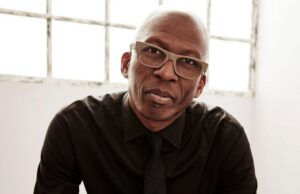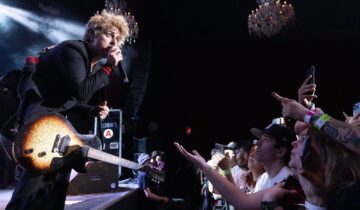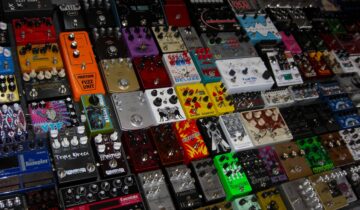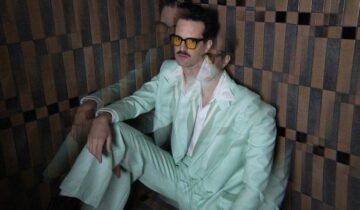 The GRAMMY-nominated hip-hop icon co-founded the group Public Enemy and the production outfit the Bomb Squad. GRAMMY.com spoke with Shocklee about his life in hip-hop, scoring music for film and TV, and his new record label.
The GRAMMY-nominated hip-hop icon co-founded the group Public Enemy and the production outfit the Bomb Squad. GRAMMY.com spoke with Shocklee about his life in hip-hop, scoring music for film and TV, and his new record label.
By GARY MOSKOWITZ for GRAMMY.com
PHOTO: MAARTEN DE BOER
AUG 22, 2023
Hank Shocklee’s earliest — and most profound — experience with hip-hop was at a roller rink in the Roosevelt neighborhood of Long Island, New York, where Grandmaster Flash and the Furious Five were performing. A young Shcokleee watched as Flash effortlessly cut, scratched and mixed Pump Me Up by the Washington, D.C. go-go band Trouble Funk, and then saw MC Melle Mel get on the microphone and rap over Flash’s music beds.
Today, we know that turntablism and emceeing are two of the essential elements of hip-hop culture. Back then, in that roller rink, those musical elements were new and raw. Flash and the Furious Five were planting the seeds of a new musical form.
“He cut it so viciously, back and forth, similar to looping now. He was on point,” Shocklee, born James Henry Boxley III, told GRAMMY.com. “That seamless integration was mind-blowing. That really was a sight, seeing that. That inspired all of hip-hop. The routine was so tight. There was a synergy. It was almost like a Motown act but with rapping. They single-handedly transformed the rap business into a show.”
Shocklee wasn’t interested in rapping, but quickly became interested in the technical aspects of creating hip-hop music. He wanted to tinker with drum machines and synths and make the music that MCs could perform on top of. Shocklee’s dreams would later make him a GRAMMY-nominated hip-hop icon.
Shocklee co-founded Public Enemy in the 1980s, creating the group’s instantly identifiable, sample-heavy sound. Later, he would found production outfit the Bomb Squad and collaborate with countless MCs and singers, and created music for films like Do The Right Thing, Juice, Get Rich or Die Tryin’, and Straight Outta Compton. He was inducted into the Rock and Roll Hall of Fame in 2013.
GRAMMY.com caught up with Shocklee over Zoom recently to discuss YE!, the latest film to feature his music, his new record label, hip-hop’s 50th anniversary, and his experiences with Public Enemy and the Bomb Squad.
This year is the 50th anniversary of hip-hop. What does that mean for you, personally?
Hip-hop is one of the things that shaped my life. DJs and producers like Grandmaster Flash, Afrika Bambaataa, the Treacherous Three — they were my heroes coming up. It was about more than just the music itself, it was the participation of the audience. I was a fan. Going to see Grandmaster Flash and the Furious Five was life changing.
I also saw Run-D.M.C. at the Garden, I saw hip-hop go from the parks and streets to little clubs, then Madison Square Garden. Back in the day, people said hip-hop was a fad. I watched it grow from its embryo stage, and saw that seed emerge to something greater than anybody could have imagined.
There’s no other music greater than hip-hop. It’s the last genre to be its own, not derivative, complete from the start.
What do you think makes hip-hop unique from other musical genres? What gives it such universal appeal?
Hip-hop is a form of folk music that involves storytelling. People are telling you about their lives in complete sentences and verses. In the early days of hip-hop, there were five verses in a song, which made the song like six or seven minutes long, up to 15 minutes. That fostered its ascent.
Words communicated ideas, and that struck me and all of the people around me. It spoke to a new generation that understood its feelings. The same thing artists rapped about is what we were experiencing. You knew exactly what they were talking about because their stories reflected your stories, so it became like a call and response.
What were your early experiences with hip-hop music and culture?
I listened to early tapes put out by Grand Wizzard Theodore, Busy Bee, DJ Hollywood, and Eddie Cheeba. They weren’t rapping but they mixed rhymes into their segues, so I was following it from that perspective.
I was always a fan of DJ culture. I created my own DJ sound systems. I came at it from the technical end, and then watched it grow.
You were a member/founder of the Bomb Squad, the hip-hop production team behind Public Enemy. What did the very early days of Public Enemy look like?
Chuck D offered to do fliers for my parties; we were both into graphic art. One day, at a party at Adelphi University, there were a bunch of terrible MCs. Chuck came on the mic to make an announcement about a party, and I heard his voice. I was like wow, I want him as my MC. I wanted to transform my DJ outfit into a show.
Chuck came into the studio and started playing around with the [Fred Wesley & the] J.B.’s “Blow Your Head” record, but played the record at 45 RPM instead of 33 so it was faster, something you could breakdance to. Chuck was pausing it, and doing things.
Flavor [Flav] walked in, saying Chuck was a great MC and we need to let people know what time it is! I thought it was a good combination. Chuck made the rhymes and Flavor hyped the record.
In a 2020 interview, you said the idea of Public Enemy was to create angst and discomfort, to shake people up. You believed that everybody was asleep, so the music had to be disruptive, and jar the senses.
Most rap music at the time was sing-songy and happy, more R&B-based, and battle raps. Poverty out here was enormous, and the crack epidemic was decimating families. There was police brutality and quasi-racism. We felt the tension between us and the police. Things were dark for us. We wrote a song for Run-D.M.C. called “God Bless the U.S.” but Russel [Simmons] didn’t like it. It was too political. So we thought, why don’t we try to do it?
Rick [Rubin] called us and said let’s do a 12-inch, but we said let’s do a whole album. We needed a full album to tell a full story. We did the whole album for about $10,000, and that record got us attention. I wanted to show what PE represented. Other groups were hybrids of musicians and drum machines, so we said let’s ditch all the musicians and just use records and take samples. That got us notoriety.
The Bomb Squad produced music for many other hip-hop artists like Doug E. Fresh, Slick Rick, LL Cool J, and Ice Cube, but also artists in other genres like Chaka Khan and Paula Abdul. How did you apply your hip-hop approach to pop music?
I started doing remixes for Madonna, Janet Jackson, Jody Watley. The idea was to take the hip-hop element and seed it into the R&B culture, and integrate singing with rapping. The Bel Biv DeVoe records…[were] a hybrid scenario, quasi-rap with singing, and we mixed it together so no one knew where the rapping and singing begins and ends.
It was a cool mix of the two. That idea caught fire. It was new and fresh. The idea was to take hip-hop and push it further.
You’ve had a second career scoring music for film and TV. Your music has appeared in Do The Right Thing, Juice, American Gangster, “Star Trek Beyond,” “Friday Night Lights,” Atomic Blonde, Mandela: Long Walk to Freedom, “The Simpsons,” He Got Game, and more. How did that second career first begin?
[Filmmaker] Ernest Dickerson came to me when he was working on the film Juice. The film was shot in the Bronx, so the question was how do we give these characters a backdrop? This was a prime case to use hip-hop throughout the entire film. Every scene in that movie had a record in it.
But we needed a score to weave the story together but keep the tension going. You couldn’t have scenes that were dead. I didn’t know anything about how to do it. There were no computers, so I had to figure it out, scene by scene. It took a lot of guesswork.
From that point on, it opened up a whole new world for me. People got used to hearing that kind of sound inside films.
Your latest project is YE!, a short African film trilogy directed by John Oluwole Adekoje, about women who use ancestral memory to reconstruct colonized minds of Black people throughout the diaspora. Can you talk a bit about the film and the music you created for it?
Now with computers, I can line things up quicker! I wanted to create an emotional feel for the film. The director already had the Fela Kuti song “Trouble Sleep Yanga Wake Am,” a tribal funeral song. I took that song and developed the entire score from it.
The idea goes back to Juice. When a director uses music in their film, everybody is vibing off that frequency. It was the same with this Fela song. Let’s clear it, keep it, and develop everything off that, with that frequency, and emotional attachment.
It’s like if you’re at a concert and the crowd is going crazy to one song. You can change to a song with the same beat, but will you get the same looks on their faces? Use the main song as a seed to grow everything else from. Get inside the music and figure out a way not to lose the perspective of what the film needs and be true to the song. It’s difficult.
What are you listening to right now? What’s in heavy rotation for you, hip-hop or otherwise?
I’m into Dua Lipa, Lizzo, Drake, 21 Savage. I love trap music. I just think we’re in a great time of music in history. Kane Brown, the country singer, you can’t get any better than that right now. There’s great ambient and electronic music, and a revival of synth pop like Boy Harsher.
There’s so much music. There’s no Top 10 anymore. There was a time when everybody knew what the Top 10 was, now everybody has their own top 10.
You recently launched a new record label, Teknimension, aimed at exploring the intersection between sound, visual, and tech mediums. Can you elaborate a bit?
It’s sort of my version of what [George Lucas’ sound reproduction company] THX does. Like, morphing sounds for film, doing soundtracks with it, doing odd things for sounds in music, like ambient stuff, and holistic healing.
The goal is to create more of a sonic and visual palate than a traditional record company. We’re releasing the soundtrack to YE! on this label in early 2024. It will include songs from artists from Nigeria, Atlanta, and songs inspired by the film.
What’s next for you in 2024? What are you looking forward to most?
Staying alive! It’s hard to say. We’re in a time when you have to create everything yourself now. The age of the Internet forces everybody to become their own everything, your own distribution, graphics. It’s about putting projects together and then finding a space to put them out in.
It’s hard to pinpoint when anything is happening, and anything can change in a second. It’s sort of like flying by the seat of your pants, but it’s been like this my whole life. Things happen when they happen.



